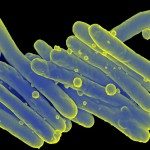Lien vers Pubmed [PMID] – 16201017
PLoS Pathog. 2005 Sep;1(1):e5
The highly successful human pathogen Mycobacterium tuberculosis has an extremely low level of genetic variation, which suggests that the entire population resulted from clonal expansion following an evolutionary bottleneck around 35,000 y ago. Here, we show that this population constitutes just the visible tip of a much broader progenitor species, whose extant representatives are human isolates of tubercle bacilli from East Africa. In these isolates, we detected incongruence among gene phylogenies as well as mosaic gene sequences, whose individual elements are retrieved in classical M. tuberculosis. Therefore, despite its apparent homogeneity, the M. tuberculosis genome appears to be a composite assembly resulting from horizontal gene transfer events predating clonal expansion. The amount of synonymous nucleotide variation in housekeeping genes suggests that tubercle bacilli were contemporaneous with early hominids in East Africa, and have thus been coevolving with their human host much longer than previously thought. These results open novel perspectives for unraveling the molecular bases of M. tuberculosis evolutionary success.



